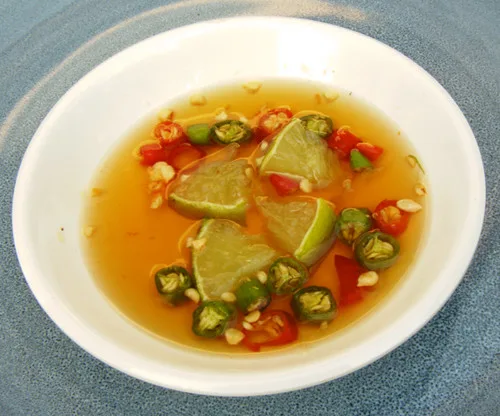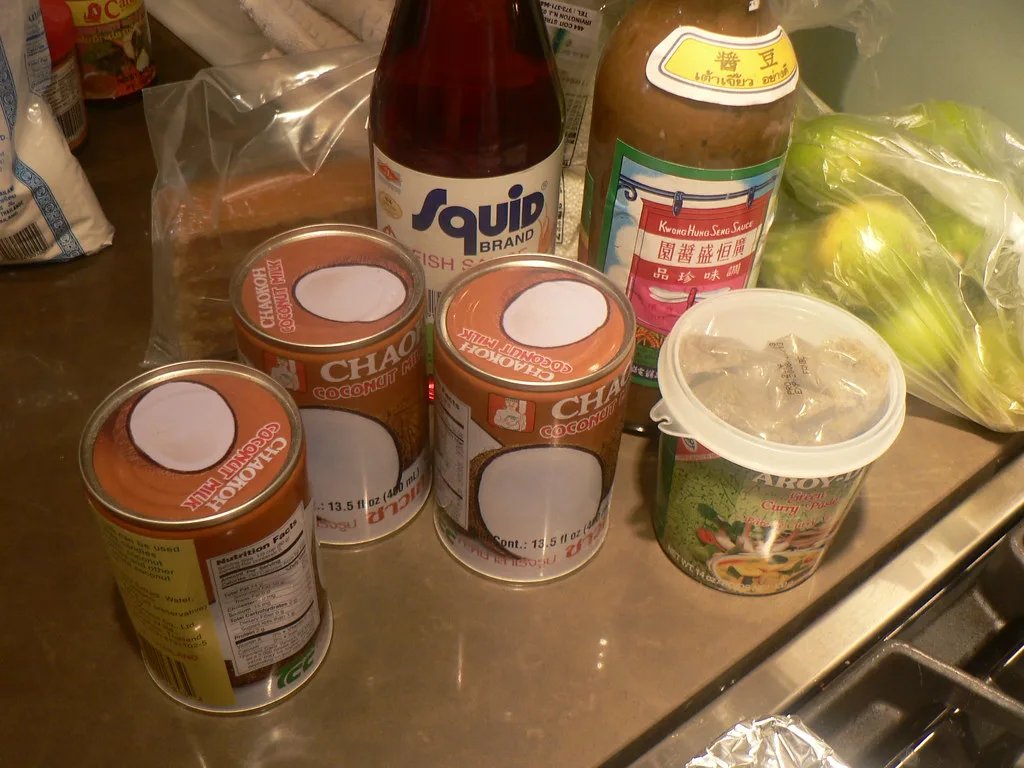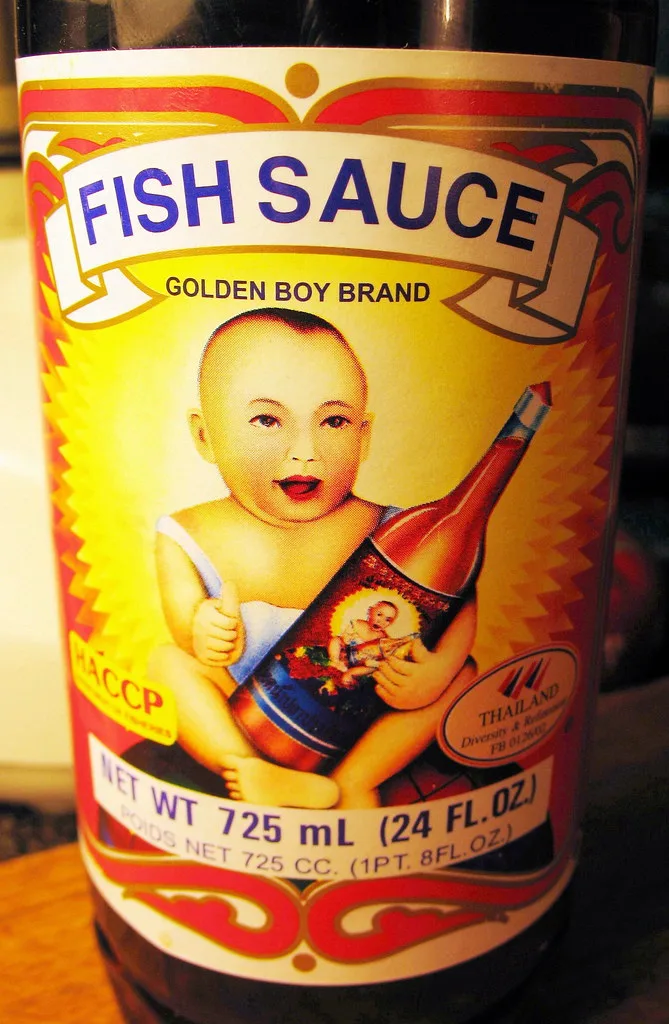In a Nutshell:
- Shelf life: 3-4 years when unopened, after opening 12 months or at least until the best-by date
- Spoilage signs: off smell, mold growth, change in consistency
- Storage: cool, dark place, tightly sealed container; refrigeration after opening helps retain quality for longer
Ever had that fish sauce bottle lurking in the back of your pantry for what feels like an eternity?
But don’t let that little bottle go to waste – fish sauce is the secret ingredient that can elevate your Asian dishes to a whole new level.
In this article, we’ll dive deep into the world of fish sauce, exploring its shelf life, how to tell if it’s gone bad, and the best ways to store it (spoiler alert: it’s not necessarily next to your oyster sauce)
Let’s jump right in.

How Long Does Fish Sauce Last?
Fish sauce is one of those pantry staples that seem to last forever, but how long does it really last?
An unopened fish sauce bottle should last for at least a year or more beyond the “expiration date.” After opening, the sauce should keep quality at least until the printed date or for a year after opening, depending on what comes later.
That’s the short version. Let’s get into the details.
Unopened Fish Sauce
Fish sauce comes with a lengthy shelf life of at least 2+ years, so it shouldn’t come as a surprise that an unopened bottle easily lasts for months beyond the expiration date.
(For instance, Red Boat fish sauce has a best-by date that’s three years from the date of manufacture.)
This lengthy shelf life is due to the fermentation process that transforms the fish into that savory liquid gold you can then use in your chicken satay or red curry shrimp.
Fermented fish products like fish sauce and anchovy paste (which is usually the base ingredient for the sauce) have a longer shelf life than many other condiments because the fermentation process acts as a natural preservative.

After Opening
Opened fish sauce retains quality for at least a year or until the best-by date printed on the label. And more often than not, it stays okay to use and flavorful for much longer than that, especially if you refrigerate it.
(It’s very similar to soy sauce in that matter, though that condiment doesn’t really require being stored in the fridge to retain quality.)
Because of the long storage time after opening, it’s probably better to pay attention to spoilage signs and the overall quality of the sauce instead of observing the expiration date. Your fish sauce likely won’t go bad anywhere near that date.
What Affects Fish Sauce Shelf Life?
There are several factors that can impact the longevity of your fish sauce, and they’re not too different from what affects the shelf life of other condiments like Sriracha or even Worcestershire sauce.
Exposure to Air
The more your fish sauce is exposed to air, the more likely it is to lose its flavor over time.
This is one of the reasons using it within a year of opening is often recommended. During that year, you’ll probably open that bottle a dozen of times, contributing to the gradual loss of flavor.
Temperature
While fish sauce doesn’t necessarily need to be refrigerated, storing it in the fridge after opening can help maintain its freshness. Much like hoisin sauce, teriyaki sauce, and other Asian condiments, storing fish sauce in a cooler environment helps prolong its shelf life.
Light
Direct sunlight or harsh indoor lighting can negatively affect the quality of fish sauce. That’s why it’s a good idea to keep it in a cool, dark place like a pantry or cupboard, similar to where you’d store vinegar.
Alright, now that we’ve covered everything related to storage time, it’s time to learn how to spot the signs of spoilage in your fish sauce. Let’s dive right in.

How to Tell if Fish Sauce is Bad?
Fish sauce doesn’t spoil easily, but that doesn’t mean fish sauce can’t go bad. When checking its safety, look for mold growth, off smells, and changes in consistency.
Next, let’s dive into each of these spoilage signs in more detail, so you avoid dousing your next Asian dish with spoiled fish sauce.
Off Smells
First things first, give your fish sauce a sniff. If it smells off or unusually pungent, it’s a good indication that your fish sauce has gone bad.
Keep in mind that fish sauce naturally has a strong smell, but a spoiled fish sauce will have an even more intense, unpleasant odor.
Mold Growth
Mold can grow on the surface of the sauce, around the rim of the bottle, or even on the cap. And it’s is a clear sign that your fish sauce needs to be tossed out.
So, make sure you check all those spots, just like you would with other condiments like barbecue sauce, ketchup, or Dijon mustard.
That said, mold growth isn’t common for this condiment, even if it’s an expired fish sauce that’s a couple of years beyond the printed date.
Changes in Consistency
If the consistency of your fish sauce has thickened or become slimy, it’s time to say goodbye. Fish sauce is typically quite watery, so those changes are a clear sign something’s not right.
That said, if you leave fish sauce unsealed for prolonged periods, it might thicken due to evaporation. That shouldn’t be an issue, except for maybe a stronger umami flavor due to increased concentration.
Now that we know the signs of spoilage, let’s talk about some changes in fish sauce that might seem concerning but are actually completely normal.

Cloudy Particles and Salt Crystals Are A-Okay
Fish sauce can sometimes show changes in appearance that are harmless and don’t indicate spoilage. Let’s break down these changes and why they occur.
Protein Precipitation
Fish sauces typically have a relatively high protein content (thanks to anchovies, usually). Because of that, they can undergo a natural process called “protein precipitation” when exposed to changes in temperature.
This, in turn, can lead to insoluble precipitated proteins forming cloudy particles in the bottle.
Okay, that’s a lot of difficult words, but the takeaway here is that some cloudiness in your fish sauce isn’t bad. These clouds of protein don’t affect the safety or quality of the fish sauce, so don’t panic if you see them.
(Cloudiness is also perfectly fine in apple cider vinegar, especially if it’s an unfiltered one.)
Salt Crystals
Natural sea salt may occasionally crystallize on the bottom of a bottle of fish sauce. This is a natural process and doesn’t affect the product quality in any way.
Now that you’re well-equipped to spot the difference between spoiled fish sauce and natural, harmless changes in appearance, it’s time to discuss storage practices.

Does Fish Sauce Need to be Refrigerated?
The short answer is no, fish sauce doesn’t need to be refrigerated. Both unopened and opened bottles can be stored at room temperature.
However, refrigerating opened fish sauce can help prolong its freshness and quality. So, while it’s not absolutely necessary, it’s not a bad idea either!
(And that’s why some brands recommend you refrigerate fish sauce after opening.)
Generally, the longer you expect the fish sauce to stay around, the more sense refrigerating the leftovers makes.
If you’ll use it within a couple of months, it probably won’t make much of a difference. But if it’s going to you more than a year to finish the condiment, placing it in the fridge is definitely worth considering.
Of course, if you prefer to keep it on your kitchen counter for easy access, it won’t be harmed in any way, as long as it’s stored properly.
Now that we’ve got the refrigeration question out of the way, let’s talk about the best ways to store fish sauce bottles.

How to Store Fish Sauce
When it comes to storing this dipping sauce, there are a few key points to keep in mind to ensure optimal quality and flavor.
Keep It Cool and Dark
The ideal storage conditions for fish sauce are a cool, dark place away from direct sunlight, like a pantry or kitchen cupboard. This helps prevent the sauce from losing its flavor due to heat and light exposure.
The same principle applies to other condiments like balsamic vinegar, rice vinegar, and cocktail sauce.
Seal It Tight
Always make sure the cap is tightly closed after each use. This prevents air from entering the bottle and reduces the risk of spoilage or loss of flavor.
Avoid Cross-Contamination
When using fish sauce, don’t contaminate it with other food particles or liquids.
Use a clean spoon or measuring spoons when adding it to your dishes. This will help keep your fish sauce fresh and free from contaminants, just like you would with tomato paste, molasses, or gochujang.
Refrigerate After Opening (If You Want)
If you want the fish sauce to maintain its rich flavor for as long as possible, transfer the bottle to the fridge after opening it p for the first time.
And there you have it! By following these storage tips, your fish sauce will stay fresh and flavorful for as long as possible, ready to enhance your favorite dishes whenever you need it.